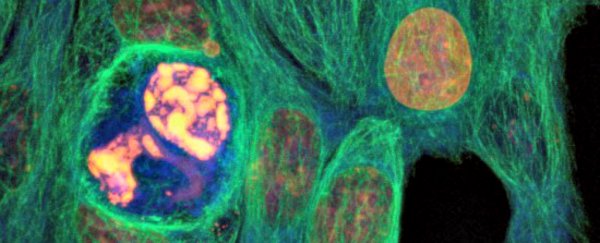Two scientists have come up with a depressing new hypothesis that attempts to explain why cancer is so hard to stop.
Maybe, they suggest, cancer's not working against us. Maybe the disease is actually an evolutionary 'final checkpoint' that stops faulty DNA from being passed down to the next generation.
To be clear, this is just a hypothesis. It hasn't been tested experimentally, and, more importantly, no one is suggesting that anyone should die of cancer. In fact, it's quite the opposite - the researchers say that this line of thinking could help us to better understand the disease, and come up with more effective treatment strategies, like immunotherapy, even if a cure might not be possible.
So let's step back a second here, because why are our bodies trying to kill us? The idea behind the paper is based on the fact that, in the healthy body, there are a whole range of inbuilt safeguards, or 'checkpoints', that stop DNA mutations from being passed onto new cells.
One of the most important of these checkpoints is apoptosis, or programmed cell death. Whenever DNA is damaged and can't be fixed, cells are marked for apoptosis, and are quickly digested by the immune system - effectively 'swallowing' the problem. No mess, no fuss.
But the new hypothesis suggests that when apoptosis - and the other safeguards - don't work like they're supposed to, cancer just might be the final 'checkpoint' that steps in and gets rid of the rogue cells before their DNA can be passed on… by, uh, killing us, and removing our genetic material from the gene pool.
"Dividing cells have to be able to pass at least four crucially important checkpoints during different phases of the cell cycle," the researchers write in the paper, published in Biotechnology & Biotechnological Equipment.
Most of these four stages, like apoptosis, are checking for DNA damage, but they can occasionally miss things, and when they do, it can lead to uncontrolled cell growth, and eventually cancer. Unchecked, the researchers say, those DNA mutations could eventually be passed on - if the carrier isn't killed first.
It sounds like something out of a particularly brutal sci-fi plot, but the authors of the paper - Rumena Petkova and Stoyan Chakarov from the Scientific Technology Service and Sofia University in Bulgaria - defend their idea by explaining that old age is pretty much a similar mechanism. After all, the planet couldn't survive if we all lived forever.
"[Cancer] seems to be a key evolution mechanism similar to DNA repair and apoptosis that protects the life on Earth as we know it from being extinguished … a kind of a supreme checkpoint to ensure replacement of generations and evolution on planet Earth," they explain.
What that means, they suggest, is that a "universal and radical" cure for cancer is unlikely to exist - but instead our best hope is to focus on finding ways to improve the lifespan and quality of life for those with the disease.
"Despite the successes of modern medicine, cancer is rarely completely cured and is likely to cause, directly or indirectly, the death of the patient," the authors write.
"Nevertheless, the medicine of today and the near future has enough potential to slow down the progression to terminal cancer so that the life expectancy and the quality of life of cancer-affected individuals may be comparable to those of healthy aged individuals."
That's obviously not an easy idea for anyone to swallow, particularly for those who are living with cancer themselves, or who have loved ones with the disease - but the good news is there's no evidence just yet to suggest that any of this is true.
Like we said before, it's just a hypothesis - and there are many out there - for why cancer has proven so challenging for modern medicine to halt. In the new paper, the researchers simply lay out scientific observations that support their hypothesis. It now needs to be tested experimentally to see if there's any evidence that it might be true.
But before we get to that point, there are already a few big holes, as Charlie Sorrel over at Fast Company points out, like the fact that cancer is more common as people get older, and therefore is most likely to kill them after reproductive age, when passing on genes is no longer an issue.
"And if a cancer comes along to do it's clean-up after we've passed reproductive age, then it's too late to stop your defective genes from being passed along," writes Sorrel. "Not that gene heredity is that cut and dried, but, like the [hypothesis] presented here, it's an interesting thought experiment."
Ignoring cancer for a second, the bottom line of all this is really the fact that we were never meant to live forever, and the idea that our body has its own safeguards in place to make sure that doesn't happen. Whether or not that's true, it's probably time to get out there and start living, huh?
